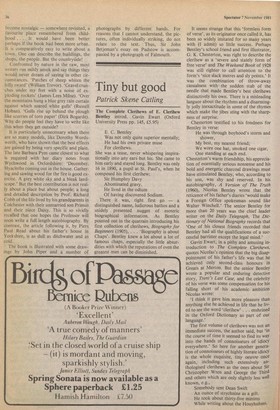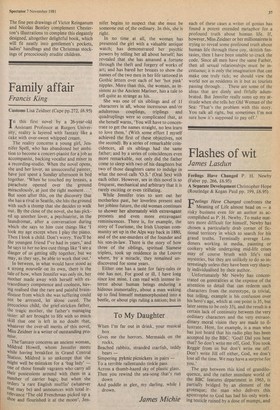Tiny but good
Patrick Skene Catling
The Complete Clerihews of E. Clerihew Bentley introd. Gavin Ewart (Oxford University Press pp. 145, £5.95) E. C. Bentley Was not only quite superior mentally; He had his own private muse For clerihews.
She was a tease, never whispering inspirationally into any ears but his. She came to him early and stayed long. Bentley was only 16 in 1890, a pupil at St. Paul's, when he composed his first clerihew: Sir Humphry Davy Abominated gravy.
He lived in the odium Of having discovered Sodium.
There it was, right first go — a distinguished name, ludicrous bathos and a snidely presented nugget of esoteric biographical information. As Bentley pointed out in the quatrain introducing his first collection of clerihews, Biography for Beginners (1905), . . . `Biography is about Chaps'. Bentley knew a lot about a lot of famous chaps, especially the little absurdities with which the reputations of even the greatest men can be diminished. It seems strange that this `formless form of verse', as its originator once called it, has been so widely imitated for so many years with (I admit) so little success. Perhaps Bentley's school friend and first illustrator, G. K. Chesterton, was right to describe the clerihew as a `severe and stately form of free verse' and The Weekend Book of 1928 was still righter to call attention to the form's `nice slack metres and sly points.' It was the combination of throw-away casualness with the sudden stab of the needle that made Bentley's best clerihews distinctively his own. There is a misleading languor about the rhythms and a disarmingly jolly inexactitude in some of the rhymes which make the jibes sting with the sharpness of surprise.
Chesterton testified to his fondness for Bentley in verse: He was through boyhood's storm and shower, My best, my nearest friend; We wore one hat, smoked one cigar, One standing at each end.
Chesterton's warm friendship, his appreciation of essentially serious nonsense and his bold and energetic charcoal drawings must have stimulated Bentley, who, according to his son, was shy and reserved. In his autobiography, A Version of The Truth (1960), Nicolas Bentley wrote that the reticence of his father's diaries `would make a Foreign Office spokesman sound like Walter Winchell.' The senior Bentley for more than 20 years was the chief leader writer on the Daily Telegraph. The Dictionary of National Biography records that 'One of his closest friends recorded that Bentley had all the qualifications of a successful barrister except the legal mind.'
Gavin Ewart, in a pithy and amusing introduction to The Complete Clerihews, quotes Nicolas's opinion that the big disappointment of his father's life was that he achieved only second-class honours in Greats at Merton. But the senior Bentley wrote a popular and enduring detective story, Trent's Last Case, and the celebrity of his verse was some compensation for his falling short of his academic. ambition Nicolas wrote: `I think it gave him more pleasure than anything else he achieved in life that he lived to see the word `clerihew' . . . enshrined in the Oxford Dictionary as part of our language.'
The first volume of clerihews was not an immediate success, the author said, but 'in the course of time it seemed to find its way into the hands of connoisseurs of idiocy everywhere.' So here for another generation of connoisseurs of highly literate idiocy is the whole exquisite, tiny oeuvre once again, including such extensively anthologised clerihews as the ones about Sir Christopher Wren and George the Third and others which are only slightly less well known, e.g., Somebody sent Dean Swift An ounce of strychnine as a gift.
He took about thirty-five minims While writing about the Houyhnhms. The fine pen drawings of Victor Reinganum and Nicolas Bentley complement Chesterton's illustrations to complete this elegantly designed, altogether delightful book, which will fit neatly into gentlemen's pockets, ladies' handbags and the Christmas stockings of precociously erudite children.



























































 Previous page
Previous page